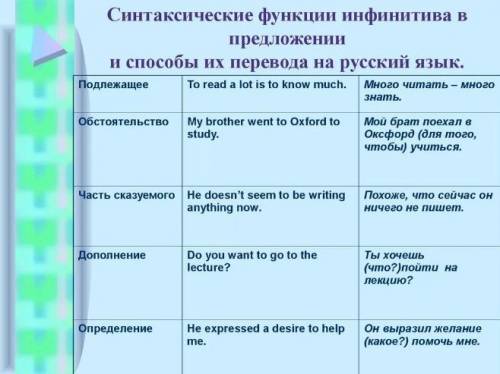Read the text again and choose the
correct answers.
1 What type of text is it?
a a supermarket website
b an educational leaflet
C a protest group handout
2 The author wrote the text to ...
a invite. b advertise. c complain.
3 Why do freegans eat food from bins?
a Because they're hungry.
b To show that it's safe to eat it.
c To protest against food waste.
4 How much food never gets to the shops?
a Forty per cent of all food in the world.
b Six million tonnes of food.
c One third of food supplies.
5 Which protest action does the text not suggest?
a A supermarket boycott. b A petition.
c A public protest.
6 The text encourages people to ...
a support freegans.
b stop buying yoghurt.
c give food to the poor.
1) Чтобы сделать всё, о чём ты нужно время, я не смог выполнить твою Инфинитив: "To do"
Выполняет функцию подлежащего.
2) Поезд в Киев должен был отправиться в 9 часов вечера.
Инфинитив: "To start"
Выполняет функцию обстоятельства.
3) Это будет первая вещь, которую я сделаю, когда вернусь домой.
Инфинитив: "To do"
Выполняет функцию определения.
4) Чтобы достать свежий экземпляр "Утренней Звезды", мне придется пойти в библиотеку.
Инфинитив "To get"
Чтобы достать (что?)
Выполняет функцию дополнения.
5) Когда я переводил эти артикли, у меня было несколько словарей, которые мне.
Инфинитив "To help"
Выполняет функцию определения.
Словари (зачем, какие) для Честно, я точно не знаю, про функции, но перевод верный, про функции инфинитивов я почитала в интернете, но это по-моему 9 класс. А я в 8-ом. Я прикрепила файл, прочитай про функции инфинитивов.

Упражнение 1. Complete the pairs ofsentences. Use the Present Perfect in one sentence and the Past Simple in the other.
1. I (know) her for six years. I (know) him when I was at school.
2. He (live) în Paris from 1997 to 2000. He (live) in New York since 2001.
3. Where's Pete? I (not see) him for ages. I (not see) Pete last night.
4. We (be) at primary school from 1993 to 1998. We (be) in this class since September.
5. I (not watch) this video yet. I (not watch) _a video at the weekend.
1. I (have known) her for six years. I (knew) him when I was at school.
2. He (lived) în Paris from 1997 to 2000. He (has lived) in New York since 2001.
3. Where's Pete? I (have not seen) him for ages. I (did not see) Pete last night.
4. We (were) at primary school from 1993 to 1998. We (have been) in this class since September.
5. I (have not watched) this video yet. I (did not watch) a video at the weekend.